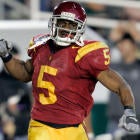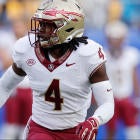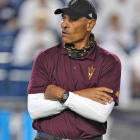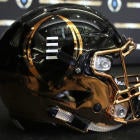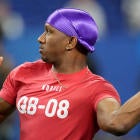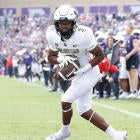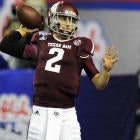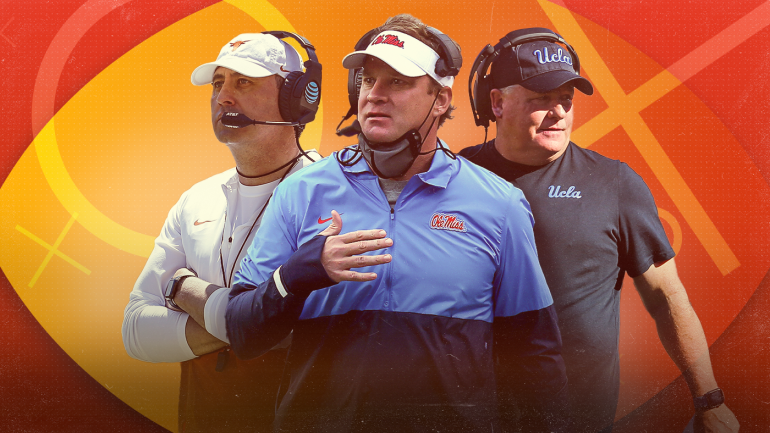
College football is a sport that has changed a lot over time. The game is continually evolving not only on the field but off it as well. Rule changes and dynasties can come and go, and programs can even change conferences. But while all this change rages on unabated, there's one thing that's held true throughout nearly all of it: We rank everything, including college football coaches.
This has been the case here at CBS Sports for the better part of the last decade, and that time of the offseason has come around once again with our Power Five college football coach rankings sitting front and center. Our rankings include every coach in a Power Five conference as well as Notre Dame.
As for how the rankings are decided, a panel of college football writers from CBS Sports and 247Sports submit ballots and vote. The ballots are compiled, and the rankings are final and irrefutable.
OK, so they aren't irrefutable, that's impossible. Every single voter has their own criteria for ranking coaches. Some value accomplishments on the field above all else, while others may give greater weight to recruiting prowess or the possibility of future success.
There is no right or wrong way to do the rankings, and that's largely what makes the final results so fun. It's also why I spend weeks getting yelled at by fans who believe I'm the only voter in these rankings because my name is in the byline.
Want more college football in your life? Listen below and subscribe to the Cover 3 College Football podcast for top-notch insight and analysis beyond the gridiron.
While we rank all 65 coaches in the Power Five, we separate the top 25 from the rest. You will see those in this space on Wednesday. So before we unveil the top 25 coaches in the country, let's take a look at those ranked from 65-26.
| 65 | |
| Shane Beamer: While none of our voters subscribe to the same approach to their rankings, every year we tend to see new coaches without experience running their own program end up on the bottom. Beamer has a famous name and plenty of experience as an assistant at the Power Five level, but he's never even been a coordinator, which probably hurt him compared to his two fellow newcomers. 2020 rank: n/a | |
| 64 | |
| Jedd Fisch: Fisch has never been the head coach at any previous stops, but he does have experience as an offensive coordinator at both the college and NFL levels. This gives him a bit of a bump against Beamer. 2020 rank: n/a | |
| 63 | |
| Clark Lea: The former Commodore returns home for his first head-coaching gig after spending the last three seasons as Notre Dame's defensive coordinator. Lea is taking on one of the toughest jobs at the Power Five level, and I want him to know I did not hold him taking my former Cover 3 Podcast co-host Barton Simmons away from me against him when filing my ballot. 2020 rank: n/a | |
| 62 | |
| Dave Aranda: One of the more challenging obstacles this year was figuring out how to treat coaches who only have one year on the job, and that year just happened to be during a pandemic that drastically altered the job for all involved. Trying to balance that with everything else is tricky. When it comes to Aranda, it's clear to see his 2-7 start at Baylor didn't inspire a lot of confidence from our voters. 2020 rank: 62 (E) | |
| 61 | |
| Mike Locksley: When it comes to evaluating Locksley, the trick is trying to figure out how much you hold New Mexico (2-26 in 2+ seasons) against him. My guess is that wins at Maryland would erase it quickly, but after a weird 2-3 season that has him at 5-12 through his first two seasons, we haven't reached that point yet. 2020 rank: 61 (E) | |
| 60 | |
| Matt Wells: Wells has been heading in the wrong direction. When first hired from Utah State, he debuted at No. 43 in 2019. He dropped eight spots to No. 51 after a 4-8 debut and drops another nine following a 4-6 season. I think that's a bit harsh (I had him at 54) considering you can make a strong argument that Tech improved last season. 2020 rank: 51 (-9) | |
| 59 | |
| Dino Babers: Dino's rockstar status is quickly dissipating. After a 10-3 season in 2018, Babers ranked 27th in our 2019 rankings. Last year he dropped to 48 after a 5-7 season, and now after going 1-10, he's plummeted again. Still, I'm not sure how much the 2020 season should be held against him considering the injuries and opt-outs, but 2021 is probably a crucial year for Babers. If it's not good enough, he might not be in these rankings at all next spring. 2020 rank: 48 (-11) | |
| 58 | |
| Nick Rolovich: Honestly, what was there to evaluate? Rolovich's first season at Washington State consisted of only four games, and he went 1-3. Rolovich probably dropped eight spots in the rankings due to being "forgotten" more than anything else. 2020 rank: 50 (-8) | |
| 57 | |
| Mel Tucker: I was very surprised to see Tucker drop a couple of spots, but it's probably because I have him ranked too high. Tucker checks in at No. 39 on my rankings, but that's largely because he exceeded my expectations for 2020. When you consider the timing of Tucker's hire at Michigan State and how it narrowly preceded the pandemic changing everything, the 2020 season was promising! Obviously, my fellow voters are not as enthusiastic as myself. 2020 rank: 55 (-2) | |
| 56 | |
| Jonathan Smith: I'm going to pin Smith's drop on the absence of Barton Simmons as a voter. Simmons was always a Smith booster. Like Rolovich and the rest of the Pac-12, Smith didn't give us much of anything to work with last season. The Beavers followed up a promising 5-7 season in 2019 with a 2-5 campaign last year. The 2021 season should give us all a better idea of what to expect going forward. 2020 rank: 52 (-4) | |
| 55 | |
| Geoff Collins: The thing about Collins is that I can't figure out whether I should buy in or not There are times when I'm all in, and other times he just rubs me the wrong way. I was kind of surprised to see him climb a couple of spots this year, considering he's only 6-16 through his first two seasons at Georgia Tech. Of course, transitioning from an option program to a more modern one takes time, and a pandemic season didn't speed up the process. 2020 rank: 57 (+2) | |
| 54 | |
| Karl Dorrell: It feels like the voters wanted to reward Dorrell for an excellent first season in Boulder, but they didn't want to get carried away. As a result, Dorrell climbs 10 spots after shocking the world with a 4-2 year, but he's still solidly in the mid-50s. Dorrell's career seems to be one of coaching teams with a high floor but limited ceiling. Should he continue that at Colorado, he'll likely have a similar performance in these rankings. 2020 rank: 64 (+10) | |
| 53 | |
| Jeff Brohm: As an unabashed Jeff Brohm stan for a few seasons, it has hurt to see him tumble so far down our rankings. Brohm was on the cusp of the top 25 in 2019 when he was ranked 28th before dropping to 44th last season. Now he's down to 53rd following a 2-4 season. Things started well in West Lafayette with two bowl appearances in his first two seasons, but the Boilermakers are only 6-12 since and 5-10 in the Big Ten. 2020 rank: 44 (-9) | |
| 52 | |
| Josh Heupel: Unlike the other first-year Power Five coaches we've discussed, Heupel comes to Knoxville with head-coaching experience. He went 28-8 at UCF with a conference title, and that's boosted his stock a bit with our voters. Of course, I would be remiss if I didn't mention that Heupel's first season at UCF was his best, and the record worsened with each passing season. Heupel is also inheriting a very different situation at Tennessee than the one he found at UCF. 2020 rank: n/a | |
| 51 | |
| Jimmy Lake: I think Lake's first season at Washington showed promise, as the Huskies went 3-1 and won the Pac-12 North despite not being able to play for the Pac-12 championship. It didn't take long for Lake to establish his personality and identity on the program. 2020 rank: 56 (+5) | |
| 50 | |
| Sam Pittman: Yessir, Pittman is one of our highest climbers this season. He finished last in our rankings last season but surprised many people by winning three SEC games in his first season. Those three conference wins were three more than Chad Morris had in his two seasons and the most the Razorbacks had in a single season since going 3-5 in 2016. 2020 rank: 65 (+15) | |
| 49 | |
| Justin Fuente: Some of our voters will tell you that the only reason Fuente remains at Virginia Tech and in these rankings is the size of his buyout. Maybe that's the truth, maybe it isn't, but the fact of the matter is the last three years haven't gone according to plan. After starting 19-8 in his first two seasons with the Hokies, Fuente's teams have gone 19-18 the last three years and 14-12 in the ACC. The Hokies missed out on a bowl game for the first time since 1992 last season. 2020 rank: 37 (-12) | |
| 48 | |
| Clay Helton: Helton's stock is fascinating to chart when it comes to our rankings. USC went 5-1 last season, reached the Pac-12 title game ... and he falls seven spots in the rankings. If you look at his overall record at USC (45-23 with a conference title), there's no way he should be ranked this low, but that's not how it's viewed. Helton's performance is compared to what a coach's record at USC should be. He hasn't done enough in the minds of our voters. 2020 rank: 41 (-7) | |
| 47 | |
| Scott Frost: Only two coaches fell further in this year's rankings than Frost, and the 13 spots he drops this season are tacked onto the nine he fell last year. That's 22 spots in two years for a coach widely viewed as a "no-doubt, home-run hire" at Nebraska. Well, he's 12-20 in three seasons with the Cornhuskers, and that 13-0 season at UCF just seems further away with every loss. 2020 rank: 34 (-13) | |
| 46 | |
| Steve Sarkisian: So, how about this spot for Sark? He was 46-35 in seven seasons at Washington and USC, and he hasn't been a head coach since 2015, but he starts out in our rankings two spots ahead of the man who replaced him at USC. And you can argue that Sark was more underwhelming at USC than Helton has been! Of course, it's easy to understand why given he's coming off an extremely successful stint as Alabama's offensive coordinator and was a surprise hire. 2020 rank: n/a | |
| 45 | |
| Scott Satterfield: He fell further in our rankings this season than all but one coach -- and I suppose you can say the coaches who were fired fell even further -- dropping 14 spots from No. 31 last season to No. 45 this year. I think it's probably too severe, but when you get to this midfield portion of the rankings, recency bias tends to play a much larger role because there's so little that splits the candidates. So you see Satterfield going 4-7, and it's a little easier to mark him below similar coaches coming off better seasons. 2020 rank: 31 (-14) | |
| 44 | |
| Mike Norvell: Norvell fell further than any other coach, which was something of a surprise. I think it's a little bit of a course correction as we all might have been a little too high on him to start last year. It was one of the biggest hires of last offseason, and that no doubt impacted the voting. Then a 3-6 start in Tallahassee sobered everyone up a bit. Like I said with Satterfield, recency bias plays a big role in this area of the rankings. 2020 rank: 29 (-15) | |
| 43 | |
| Eli Drinkwitz: You know what else plays a significant impact? Exceeding expectations. Drinkwitz was ranked No. 59 last year after spending one year at Appalachian State before getting the Mizzou job, and there weren't high expectations on the Tigers heading into 2020. One 5-5 season later, and Drink is jumping up 16 spots in the rankings to No. 43. 2020 rank: 59 (+16) | |
| 42 | |
| Bret Bielema: I was interested in seeing where Bielema would end up because I think he's a perfect test case for how our voters view coaches. If we look at Bielema's history, he has three Big Ten titles, and while a 4-8 season at Arkansas was enough to get him fired after 2017, four wins is more than any Arkansas coach has won in a season since. But he was also gone from the college game for three seasons, and his last job ended poorly. So, how would he be viewed? Well, there are a lot of coaches on this list ahead of him without any conference titles to their name, let alone three! I had him at No. 30 on my ballot, which I think is fair, but he was lower among my peers. 2020 rank: n/a | |
| 41 | |
| Neal Brown: He is 11-11 through his first two seasons in Morgantown, but the Mountaineers are coming off a 6-4 season. Still, WVU fans are hoping to see the program take a further step forward, as is Brown, who went 31-8 over his final three seasons at Troy before taking the WVU job. 2020 rank: 47 (+6) | |
| 40 | |
| Jeff Hafley: All right, so at least one of our voters really likes Hafley because this is much higher than I anticipated him being. Hafley climbs 23 spots in the rankings this season, which is the third-largest jump amongst our coaches. I had him at No. 56 on my ballot, but I understand why others could be higher on him. Not only did he have a strong start in his first season at Boston College, but there's a certain air of confidence around him and the program. Still, this strikes me as too high. 2020 rank: 63 (+23) | |
| 39 | |
| Chip Kelly: I think it's safe to say the shine has come off Kelly at the college level in the minds of our voters. While nobody can deny the success he had at Oregon and how he helped change the offensive landscape, he's only gone 10-21 at UCLA and is 10-15 in the conference. 2020 rank: 36 (-3) | |
| 38 | |
| Justin Wilcox: I'm assuming Wilcox fell five spots this season because while he remained static on everybody else's ballot, our David Cobb punished him for not living up to the 10-win season that Cobb had promised Cal fans. That's not fair for David to do that, but this is America, and he's allowed to feel however he wants. Seriously, though, I'm not surprised to see Wilcox slip a little after a 1-3 season, but I'm not sure it's deserved. While every coach had new things to deal with in 2020, I've shown Pac-12 coaches a bit more leniency than others. 2020 rank: 33 (-5) | |
| 37 | |
| Chris Klieman: This was another surprise, as Klieman climbed five spots despite following up an 8-5 debut with a 4-6 season in 2020. I suspect that it's a combination of some coaches in this region of the rankings losing their jobs and there being new voters in the poll this year who might have been higher on Klieman than we were last season. 2020 rank: 42 (+5) | |
| 36 | |
| Dave Doeren: The NC State coach moves up 13 spots, and I still can't help but feel like our voters are underrating him. I mean, let's just look at the resume. After going 23-4 and winning two conference titles at Northern Illinois, Doeren has gone 55-46 at NC State in eight seasons. He's won at least seven games in five of the last six seasons and has probably gotten this program as far as anybody could reasonably expect. I have Doeren at No. 22 on my ballot, and I think my colleagues are wrong on this one. 2020 rank: 49 (+13) | |
| 35 | |
| Lance Leipold: Leipold has the second-highest ranking of any newcomer in this year's poll. That seems right, but should he be starting at No. 35? That I'm not quite as convinced, as I have him at No. 50. Still, it's hard to argue that he's an excellent hire for Kansas as the things he accomplished at Wisconsin-Whitewater and then Buffalo are exactly what Kansas needs somebody to do with its program. 2020 rank: n/a | |
| 34 | |
| Greg Schiano: It's no surprise to me that Schiano climbs in the rankings this season after going 3-6 in his first year back, but I am a little surprised he didn't climb higher than five spots. I mean, Rutgers went 3-21 over the 2018 and 2019 seasons, and Schiano matched that total in only 37.5% of as many games. Still, I guess we're all taking more of a wait-and-see approach with this one. 2020 rank: 39 (+5) | |
| 33 | |
| Mike Leach: There might not be a more polarizing coach in these rankings. The reasons people have for where they rank Leach covers everything from success on the field compared to expectations to his personality off the field. Some love him and probably overrate him a bit because of that affinity, while others are put off by him and judge him too harshly because of it. I had him at 34 on my ballot, so I can't argue much with the final standing, but I wouldn't be shocked at all to see Leach back in the top 25 next season or perhaps outside the top 40. He's the cryptocurrency of coaches when it comes to his value. 2020 rank: 27 (-6) | |
| 32 | |
| Manny Diaz: I cannot say I saw Diaz being tied for the biggest climb in the rankings (the person he's tied with, yes). Don't get me wrong, I think Miami's 8-3 season was a rousing success and a great second season for Diaz. There are also reasons for optimism heading into 2021. Still, a 26-spot jump seems extreme! Did we add, like, four Miami grads to our voting panel? 2020 rank: 58 (+26) | |
| 31 | |
| Pat Narduzzi: I sense that Narduzzi's standing as a coach is a lot like Narduzzi as a person. He seems like the kind of person that might take some time to grow on you before you begin to appreciate his personality, and his coaching seems the same way. On the surface, you might not be overly impressed by a 42-34 mark at Pitt over six seasons, but there's a consistency to the performance that you just begin to admire after a while. You know what you're getting with Narduzzi. Perhaps in a year that saw so much uncertainty, Narduzzi's consistency was comforting. 2020 rank: 40 (+9) | |
| 30 | |
| Lane Kiffin: I thought Kiffin would be higher and was surprised to see that I'm on the higher end of our voting pool. I had him at No. 21 on my ballot, and a large part of that is his teams being fun to watch. You know they're going to try to score a lot of points, and they're probably going to allow a lot of points in the process. There's a volatility to Ole Miss games that keeps you locked in, and I appreciate that. That said, maybe I'm a little too high, but will you be shocked if Lane is in the top 25 next year? 2020 rank: 35 (+5) | |
| 29 | |
| David Cutcliffe: There's a lot of respect for Cutcliffe amongst our voters for what he's been able to accomplish at Duke, considering the challenges surrounding the program and the overall lack of success. Unfortunately for Cut, that respect only gets you so far when you've gone 26-35 overall the last five seasons and 11-31 in the ACC. But the fact he's still hanging on in the top 30 despite that says quite a lot. 2020 rank: 26 (-3) | |
| 28 | |
| Dave Clawson: Clawson climbs four spots in the rankings this year despite finishing the 2020 season with his first losing record at Wake since the 2015 season. Clearly, we aren't holding it against him, nor should we. The fact that a 4-5 record at Wake is a disappointing season speaks to what Clawson's been able to do at the program and how he's changed its perception. 2020 rank: 32 (+4) | |
| 27 | |
| Bryan Harsin: It says a lot about what Harsin was able to do at Boise State that he nearly cracked the top 25 of these rankings even though he's never coached at a Power Five program before. The resume speaks for itself. He went 69-19 in seven seasons at Boise and won the Mountain West three times with six division titles. He also won a conference title during his lone season at Arkansas State before that. 2020 rank: n/a | |
| 26 | |
| Bronco Mendenhall: Mendenhall slips out of our top 25 and down to 26 in this year's ranking after going 5-5 last season. I'm going on the record now to say that I bet he's back in the top 25 next season, but I've always been a big fan of Mendenhall's teams. 2020 rank: 23 (-3) | |





















































